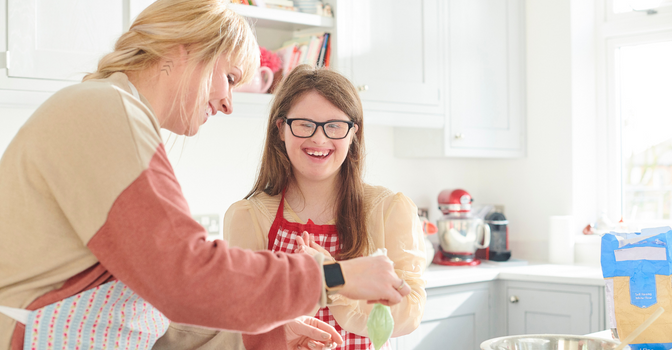Do you have a goal to live more independently? Do you struggle with some of life’s essential tasks?
Sometimes, it’s the small things that can make a big difference. Like getting support to learn how to do an everyday activity.
That’s where the Improved Daily Living Skills NDIS support budget comes in – it can help you build skills to be more independent both at home and in the community.
What can Improved Daily Living Skills funding be used for?
Improved Daily Living Skills in an NDIS Plan can be used for assessment, training or therapy to help increase your skills, independence and community participation. It’s one of the Capacity Building support budgets.
This covers a range of different supports including assessments and reports from therapists, training in skills for daily living and lots of different therapy supports.
1. Assessments and reports.
Assessments and reports can help work out the level of support you need and whether your current supports are effective. Some of the things you may be able to fund with this category include:
- Functional capacity assessments
- Occupational therapy assessments
- Assistive technology assessments
- Supported accommodation assessments
- Developmental or speech and language assessments for children.
The purpose is to provide a clear understanding of your abilities, challenges and support needs.
For example, an assistive technology assessment may be necessary for a person with communication difficulties to determine the best augmentative and alternative communication (AAC) or other technology that meets their needs.
Assessments help the NDIS determine what supports to include in your NDIS Plan. They’re also an ideal foundation for tracking the progress of your daily living goals.
2. Training.
Improved Daily Living Skills can fund various types of training that will help improve how you do everyday activities.
While the NDIS uses the word “training”, it’s actually about developing skills, like learning new things or how to take care of yourself and your home. Examples include:
- Programs or individual training in cooking, cleaning, personal hygiene and self-care that are specific to your disability
- Communication and social skills to improve your ability to interact with others and participate in social activities
- Learning to use mobility aids, AAC or other assistive technology
- Developing strategies and techniques to improve behaviour
- Training in budgeting, meal planning, shopping and getting around
- Tutoring or job coaching to support education or work goals.
If you have a parent, guardian or close friend who is helping you to live independently, you may choose to spend part of your funding on training for them. This will help them to learn skills to support you in the best way possible.
3. Therapy.
The Improved daily living skills budget can be used for a range of therapy services delivered by qualified therapists.
- Occupational therapy (OT): Focuses on improving your ability to perform everyday tasks and activities. It can support many daily living skills, like self-care, fine and gross motor skills and mobility.
- Speech therapy: Can help improve speech, language, articulation and feeding skills.
- Physiotherapy: Can improve physical mobility, strength, balance and coordination.
- Psychology or counselling: May be funded under this category when it addresses mental health issues related to a disability.
- Behavioural therapy: For developing strategies and techniques for managing and improving behaviour in daily life.
- Music therapy: Can help develop emotional, cognitive and social skills.
- Art therapy: Uses creative processes to improve mental and emotional well-being.
- Audiology: To address communication and daily living challenges related to hearing loss.
An assessment may be needed prior to beginning some therapy services. Your therapist will then develop a unique plan for you that outlines the type, frequency, duration and sessions required to reach your goals.
Once you have funding in your NDIS Plan, the therapist will implement the plan and work with you to address any challenges that come up along the way.
Finding the right supports for you.
When preparing for an NDIS plan meeting, think about your current situation and how Improved Daily Living Skills funding may assist. Below are some questions to ask yourself so you’re more prepared and likely to get the you funding need.
- What are my daily living challenges and goals?
- What are my short-term and long-term daily living goals?
- Is there anything that stops me from being as independent as I would like?
- Which aspects of daily living are most important to me in terms of getting support?
- Do I need assistive devices or technology to improve my daily living skills?
- What types of therapy could help me overcome daily living challenges?
- Can I learn some skills now that will help me be less dependent on the support of others in the future?
Keep in mind that like all supports and services purchased with NDIS funds, purchases made with Improved Daily Living Skills funding must meet the reasonable and necessary test and be related to your disability.
We can help!
If you have other ideas on how your daily needs can be supported but are unsure if it’s covered by your NDIS Plan, have a chat with the Leap in! Crew.
We can help you navigate the NDIS to ensure you’re getting the most out of your plan.
Call us on 1300 05 78 78, email us at crew@leapin.com.au or sign up to Leap in! plan management today.

